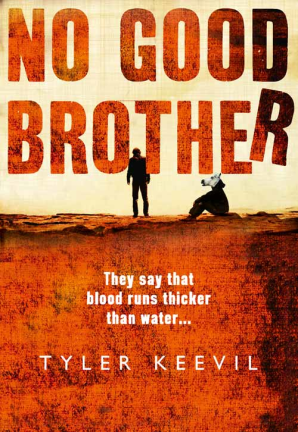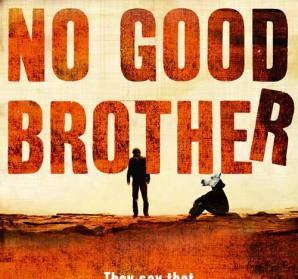
Carly Holmes reviews the humourous western novel by Tyler Keevil, No Good Brother, which follows a pair of flawed but likeable men.
For those readers who are fans of Keevil’s writing, and in particular his previous novels (Fireball and The Drive), the narrative structure and prose style of No Good Brother won’t defy expectation. Two brothers steal a racehorse, primarily to repay a debt of honour to notorious gangsters, and transport it across the border from Canada to America via land and water, becoming both internet heroes and wanted criminals along the way.
The end of this story is pretty well known, since people ended up getting killed and the trials were in the news. My brother Jake was portrayed in a lot of different ways. Some said he was just a patsy who had gotten caught up in the scheme of these upstart gangsters. Others said he did it for the money. Then there were the ones who actually believed he was an activist of some sort, or a gentleman robber…
The story is narrated by Tim Harding, the more sensible and conformist of the two brothers. He’s making a living working as a deckhand with what could be seen as a replacement family, a more functional alternative to his true kin, when his younger brother Jake, a strong-willed ex-con, turns up unannounced and derails his safe, stable existence. Using a blend of manipulation and coercion, Jake persuades Tim into accompanying him on what is supposed to be an easy one-off job with a big payout.
Like Razor, the narrator from Fireball who tells the story of his best friend Chris’s furiously-lived life, Tim is a man who cannot resist the orbit of a more dominant male. This theme of strong, potentially destructive, masculinity, in its attractions and its dangers, is one that Tyler Keevil returns to again and again in his writing, and usually, as here, via the more detached lens of a softer, ‘weaker’ male as the narrative voice. Through Tim’s compliance with Jake’s schemes, his decision to turn his back on the mundane but rewarding structures of a life lived honestly, the reader can understand the thrill and drama of being led outside of one’s comfort zone by a more charismatic personality.
From the moment the brothers steal Shenzao the racehorse, the novel is imbued with a sense of impending doom layered beneath the slapstick surface. They botch the initial theft and, unable to return her, are forced to push on with their journey. They almost lose her at a gas station after she kicks her way out of the horsebox, and eventually decide to steal the boat belonging to Tim’s employers and take it to the ocean. Ahead lies the threat of the Delaney gangsters and behind the flashing lights of pursuing police vehicles.
Then Jake started going a bit overboard. He asked me to look after Ma and also Maria … He went on like that for a while, as if to convince me and himself he was okay with it all – with impending imprisonment and possible death – until I said, ‘Just hold on a second, here.’ …
He gazed at me mutely, and for a moment we settled into familiar roles: he having gotten us into trouble, and me, as the older and more responsible one, needing to get us out.
‘There’s the boat,’ I said.
While appearing to be a helpless sidekick dragged along in the wake of Jake’s hot-headed misadventures Tim is actually the one, at pivotal moments in the novel, who takes control and makes decisions that lead the brothers further into trouble. It’s almost as though, from the relative obscurity of his brother’s shadow and his own established role as ‘the sensible one’, he has the freedom to prod at an already difficult situation, just to see what will happen. His betrayal of his employer and adopted family by stealing their boat and endangering their very livelihood reveals a character more morally dubious than his stolid demeanour would imply.
The men’s travails, as they continue their journey through storms and seasickness and a bizarre encounter with a hen party, are described with comic relish. Despite underlying anxiety for the pair, and pity for the poor horse, Keevil’s skilled and humorous story-telling sweeps the reader along with it, over the border into America and back onto shore, to the novel’s climax: the showdown with the Delaneys.
The ladies from the hen party applauded and cheered, as if the performance had been put on for their benefit. When the applause died down, Brenda called out, ‘Who are you?’
Jake ran his hand down Shenzao’s neck, and patted her shoulder.
‘We’re Poncho and Lefty, ladies. The notorious desperados.’
Kelly shouted, ‘Will you marry me?’
‘You wouldn’t want to marry me, ma’am. I’m a no-good horse thief.’
‘You’re heroes!’
This is a picaresque tale of male relationships, told in Tyler Keevil’s trademark muscular prose. Tim’s narrative voice is unwaveringly wry and colloquial, recounting laugh-out-loud funny moments with the same self-deprecating pragmatism as the truly tragic ones. Females are largely physically or figuratively absent: Sandy, the Harding sister, is dead and her loss is the tragedy that has defined the brothers’ lives; their mother is lost to some kind of dementia or grief-state; and Maria, Jake’s ex-girlfriend, is a drug addict.
It is Maria’s young daughter, Sam, who provides the novel with a refreshingly active and strong female character. She saves the brothers, both literally and metaphorically, and changes the course of their lives, as well as their mother’s. A Princess Charming, she jolts Ma some way from her state of mental disintegration and returns her to her family. The spitting image of their dead sister, clearly the child of one or the other of the Harding men (Tim’s position as the protective older brother is further shaken by the revelation that he had a sexual relationship with Maria while she was with Jake), Sam is a delight, thus proving that, though his preoccupation may be more concerned with the masculine, Keevil can write female characters with as much insight and depth.
Though on one level No Good Brother reads as a shambolic romp, a madcap adventure conducted by two flawed and likeable men, it has so much heart and so much tenderness, particularly around the brothers’ relationship with Sam and their memories of Sandy, that it delivers a real emotional impact. I spent the novel rooting for them, and for poor stoic Shenzao, to make it to a happy ending.
No Good Brother by Tyler Keevil is available now from Harper Collins.
Carly Holmes contributes to Wales Arts Review regularly.











